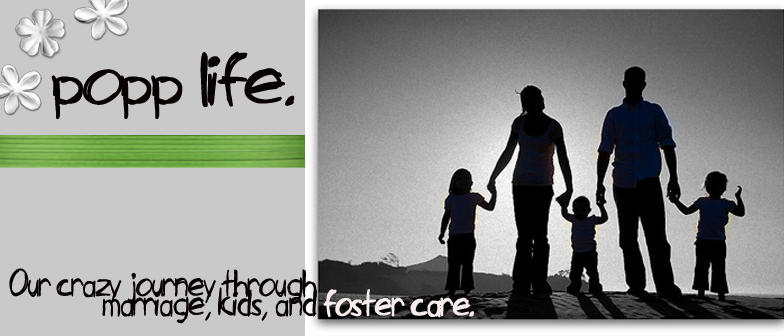In just a couple of weeks I am going to start co-teaching a training class for people interested in licensing to foster. (In our parts, and in lots of states, it’s called a MAPP class, but it goes by many names.)
I’m a little nervous. Even though I went through an ungodly number of training hours (40!!!!) to become a leader, this will be the first time I’ve taught through the curriculum. I’m co-teaching with our family worker, which is great, we have a good working relationship and I feel like we’ll do well together.
Anyway, mostly just posting to ask a few questions of the foster parents out there….
What did you really like about your foster training? What didn’t you like? What should there have been more of? What would you change? Fill me in.
There’s not a ton of wiggle room in the curriculum, but I’d be happy to hear your thoughts!

Role play. And make sure the people in the class have each other's contact information. Both things that were sadly lacking from my training class.
ReplyDeleteIn TX it is called PRIDE classes. I appreciate honesty, honesty, honesty. Don't tell me we will only get calls about kids in our age bracket specification, because we won't. Don't call and tell us the child will likely go to adoption, because they won't. Don't tell us if we are honest with our agency and always report any little tiny accident that occurs, that we will be covered...because we won't. That being said, we appreciated the straight and honest truth about what it is like to navigate the foster care system.
ReplyDeleteLike: personal stories, space and time to network with the other foster parents-to-be, role play, honesty, guest speakers (investigators, matchers, bio parents, adoptive parents, ect)
ReplyDeleteDis-like: reading straight from the book
Good luck!
Just a word of encouragement...for my work, I recently started teaching Life Skills groups to teen girls (talking about drugs, pregnancy, etc.)...and let me tell you, if even I can get up and talk to teens with 'tudes, you are gonna be AWESOME at this teaching thing!
ReplyDeleteJust a word of encouragement...for my work, I recently started teaching Life Skills groups to teen girls (talking about drugs, pregnancy, etc.)...and let me tell you, if even I can get up and talk to teens with 'tudes, you are gonna be AWESOME at this teaching thing!
ReplyDeleteWe liked hearing real life stories. I know this could be a problem with privacy, but hearing the principles taught in the class applied to life helped me understand. Especially in the discipline classes.
ReplyDeleteOne thing I'm glad we didn't have to do is role play!! Our teacher said they don't do that because it can bring up feelings of competition and discomfort between the class members when an open forum where everyone is comfortable is best.
I second Laurie. I've yet to get a call in my age bracket [elementary school] and they totally disregard gender [despite the fact that the room is ALL girl]. Also, don't expect an immediate call. Sometimes they act like the need for foster parents is great, but they are really trying to fill some sort of quota. It took over 6 months before I got my first call, and that was for respite [and I couldn't do it b/c of vacations]. It was another 6 months before I got a call for a placement and it was for an older boy who was expelled. Did not fit my profile at all. The next call was for a middle schooler, which did not work with my schedule. Low and behold, the 3rd placement call [1 1/2 years after I became a foster parent] I gave in and took a 17 year old. I guess the key is flexibility...?
ReplyDeleteLots of things I would change about my training, but that would mean me writing a book. So I'll mention what I really liked: At the last class, there was a "panel" discussion. We had several "guests" including 2 foster parents, a former foster child and some DSS staff. We got to ask them questions and hear their advice. It was VERY helpful and very interactive. I probably learned more from that then most of the training!
It's awesome that you are doing this. We had a foster parent co-teach our class. It was good to have someone who has been in the "trenches" giving instruction. It means more than someone who has never actually had a foster child in their home. [P.S....sorry, I think I did write a book....]
I agree with the role play. The panels were very good too. We also had a former foster kid and current foster parents come in to talk to us. There was lots of interaction but there were 2-3 people who overran the meetings. It got to the point where the instructors did not have control over the classes anymore. Those people thought they were so witty but it lengthned the classes and shut everybody else down.
ReplyDeleteSTAY ON TOPIC. If you're talking about abuse and somebody asks if they can set up a bank account for the kid, table the question and get back to it if there's time at the end.
Also give out a timeline. Not a "in 3 months, this will happen." More like a, "next you will be assigned a social worker who will do a home study. They will interview you togehter, apart and there is a requirement that the second interview takes place a week after the first. If everything goes well, you get assigned a resurce worker who will meet with you then present you before the cert board..." and so on. It didn't seem that anybody anywhere along the process knew what the next step was.
Also connect people to the local foster family associations. I'm having serious doubts of leaving our kids with anybody we met in the class for respite...